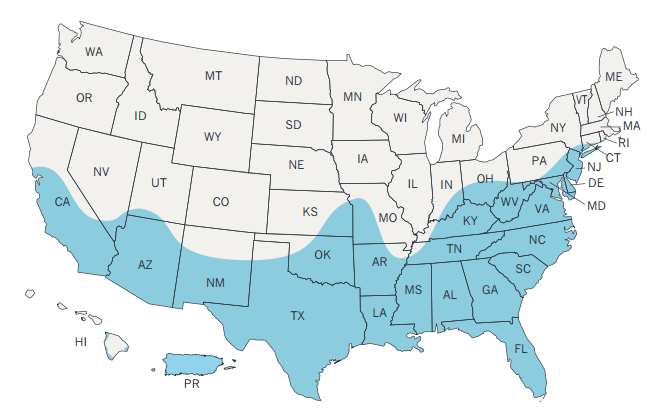
Accurate information can be the greatest tool in the fight against diseases, infectious or vector-borne. NAIAD slide.
Brazil endures an outbreak of Yellow Fever in early 2017. Mosquitoes transmit Yellow Fever from one mammal host to another. Famously, Yellow Fever had to be controlled to allow construction of the Panama Canal between 1910 and 1915.
It should be just a matter of days, or perhaps a few hours, before harpies on the right and in anti-science trenches demand “return” of DDT to fight this outbreak, arguing that EPA didn’t know what it was doing when it banned DDT from farm use, and probably dropping cheap shots at Rachel Carson and “environmentalists.”
Yellow Fever is usually carried by mosquitoes in the species Aedes aegypti, a nasty little bug that carries several diseases to humans including Zika virus and West Nile virus.
Astute observers know that A. aegypti are almost ubiquitous in warmer human cities, so the transmission of the disease requires only that a host (usually human) shows up infected with the pathogen, and an epidemic might occur.
Those observers also know that all mosquitoes are resistant or immune to DDT and frequently to other pesticides as well, their having been bombarded with pesticides for 60 or more years, and consequently having evolved resistance alleles. So spraying with DDT won’t work.
That’ won’t stop those who relish slandering Carson or who wish to impugn the humanity and good motives of environmentalists.
Get facts, first.
Come Dr. Anthony Fauci and Dr. Cahtharine Paules of the U.S.’s National Institute of Allergy and Infectious Diseases (NAIAD), part of the National Institutes of Health (NIH) to offer information to calm the hyperventilated, and to inform the serious and concerned citizen with an article in the New England Journal of Medicine, explaining Brazil’s problem, Yellow Fever, and what U.S. residents need to do, and this press release from NAIAD to get the key points across quickly.
Will anyone listen?
Yellow Fever in the Americas
Current Outbreak Merits Close Watch
March 8, 2017The unusually large outbreak of yellow fever now occurring in rural Brazil deserves careful attention by world health authorities, notes Anthony S. Fauci, M.D., director of the National Institute of Allergy and Infectious Diseases (NIAID), one of the National Institutes of Health. Writing in a Perspectives piece for the New England Journal of Medicine, Dr. Fauci and his associate Catharine I. Paules, M.D., note that this latest outbreak of a serious mosquito-borne virus comes as Zika virus, which is spread by the same mosquito as yellow fever virus, continues to affect countries throughout the Americas.
Historically, yellow fever has claimed millions of lives, including many thousands in the United States. The Philadelphia epidemic of 1793, for example, killed approximately ten percent of the city’s population. In its most serious form, yellow fever symptoms include high fever, hemorrhagic manifestations, kidney failure, liver malfunction and jaundice (yellowish appearance of the eyes and skin, which gives the disease its name.)
A vaccine has been available since 1937 and confers lifelong immunity in up to 99 percent of those who receive it. Extensive immunization campaigns, along with effective mosquito control—especially in developed countries—have reduced yellow fever cases worldwide. Nevertheless, localized outbreaks in parts of Africa and Central and South America account for an estimated 84,000 to 170,000 severe cases of disease and between 29,000 and 60,000 deaths annually.
The Brazilian outbreak is a manifestation of the “sylvatic,” or jungle, transmission cycle in which forest-dwelling mosquitoes spread the virus primarily to non-human primates, with humans serving only as incidental hosts. At this time, there is no evidence that the outbreak is transforming into its “urban” cycle, but authorities should remain alert for this possibility, the authors note. In the urban cycle, yellow fever virus is usually spread by city-dwelling Aedes aegypti mosquitoes directly to people. An urban cycle of yellow fever in Angola and the Democratic Republic of Congo that began in late 2015 caused 961 confirmed cases and 137 deaths. During that outbreak, write Drs. Fauci and Paules, the world’s emergency vaccine stockpile reserve was exhausted, limiting the number of available vaccine doses and making the outbreak more difficult to control. To prevent a similar occurrence during a future yellow fever outbreak in Brazil or elsewhere, “early identification of cases and rapid implementation of public health management and prevention strategies, such as mosquito control and appropriate vaccination, are critical,” they write.
In an era of frequent international travel, an increase in domestic cases in Brazil has the potential to spread yellow fever to non-endemic areas and could pose serious disease-control challenges, Drs. Fauci and Paules observe. They urge clinicians, especially those in the United States and other places where yellow fever is uncommon, to inform themselves about yellow fever symptoms and to adopt a high index of suspicion for this diagnosis, particularly when examining travelers returning from affected regions.
ARTICLE:
CI Paules and AS Fauci. Yellow fever: Once again on the radar screen in the Americas. New England Journal of Medicine DOI: 10.1056/NEJMp1702172 (2017).WHO:
Dr. Fauci is available to discuss this article.CONTACT:
To schedule interviews, please contact Anne A. Oplinger, (301) 402-1663, aoplinger@niaid.nih.gov.








